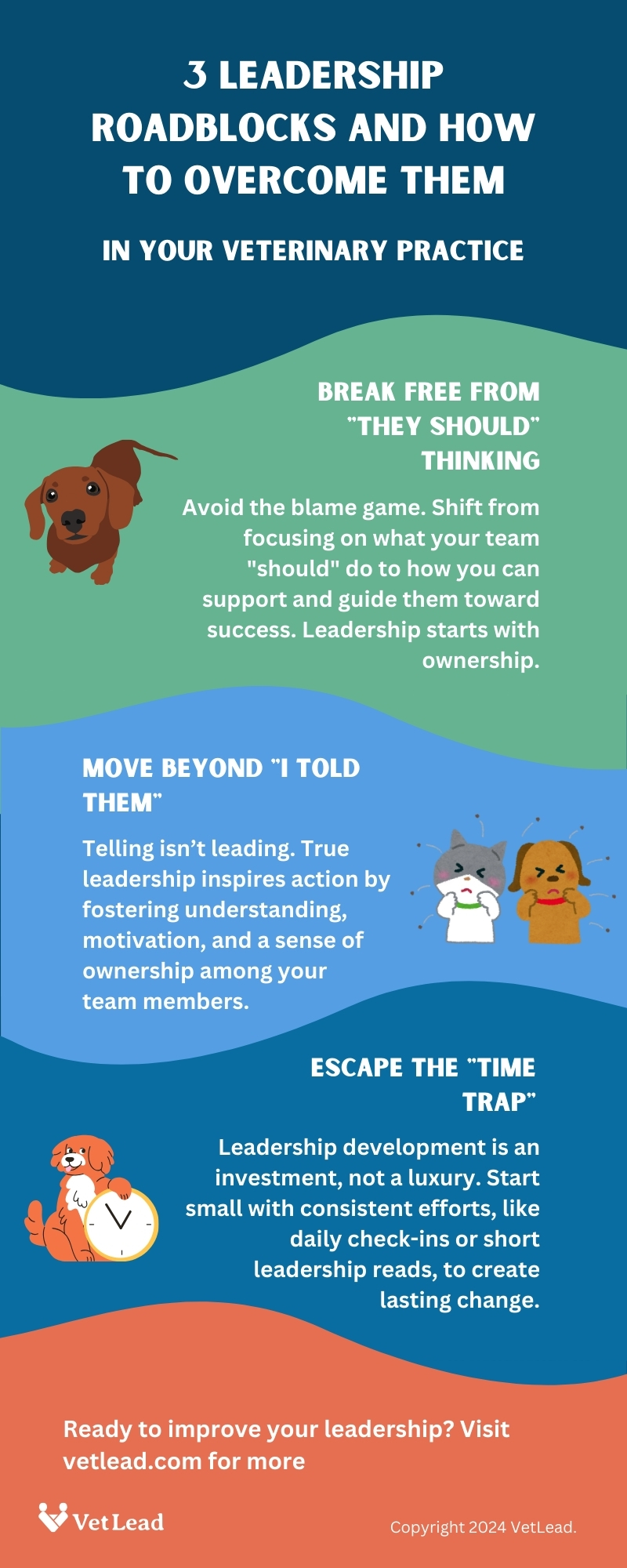Feeling stuck in your veterinary leadership role? You're not alone. Many veterinary professionals, especially those juggling the demands of clinical practice, client communication, and team management, find themselves grappling with self-limiting beliefs that hinder their success. But what if the biggest obstacle isn't the endless to-do list, the demanding clients, or even the occasional staff shortage? What if the most significant barrier to your leadership success is actually you?
Overcome These Common Veterinary Leadership Challenges
Even the most dedicated and skilled veterinary professionals can fall prey to self-sabotaging thoughts and behaviors. These mental roadblocks can hinder your ability to lead effectively, create a positive work environment, and achieve your professional goals. Let's explore three common mindset challenges that often plague veterinary leaders and discover how to overcome them.
1. The Blame Game: How "They Should" Thinking Holds You Back
It's easy to fall into the trap of "they should" thinking, especially when faced with challenges. "They should be more proactive." "They should care more about their work." "They should just listen to me." This type of thinking, while understandable in moments of frustration, can be incredibly detrimental to your leadership effectiveness. Why? Because it places the responsibility for change solely on the shoulders of others, leaving you feeling powerless and stuck.
The Veterinary Leadership Program
Get info on this exclusive program.
Learn how to:
- 1Build an accountable team
- 2Make change happen
- 3Improve performance
- 4Hire exceptional talent
Includes live coaching.
Investment will be $897 per person
"They should" thinking often masks deeper issues. Perhaps there's a lack of clarity in your communication, a need for more effective training, or an underlying issue affecting team morale. By focusing on what "they" should do, you avoid taking ownership and exploring solutions within your control. This not only prevents you from addressing the root cause of the problem but also creates a sense of resentment and disengagement within your team.
Help Your Team Make Progress
Instead of stewing in frustration, try shifting your mindset. Instead of "They should...", think "They should... and I can help them get there by..." This simple shift transforms a complaint into a leadership opportunity. How can you support your team, provide clearer expectations, or offer guidance to help them succeed? Perhaps it's through more effective delegation, creating a mentorship program, or simply taking the time to listen to their concerns and provide constructive feedback.
2. Beyond "I Told Them": Why Telling Isn't Helping

As veterinary leaders, we're often tempted to rely on the power of "telling." "I told them to do it this way." "I told them what the deadline was." But if simply telling people what to do were enough, leading a high-performing veterinary team would be a breeze!
The truth is, people change because of their own thoughts and motivations, not just because of our words. True leadership involves influencing those thoughts, inspiring action, and fostering a sense of ownership within your team. It's about creating a culture where individuals feel valued, empowered, and motivated to contribute their best.
Create an Environment of Opportunity
Think about it: have you ever told yourself to do something – exercise more, eat healthier, finally organize that overflowing inbox – only to find yourself falling back into old habits? We don't always act on what we tell ourselves, so why should we expect our teams to be any different?
Effective leadership goes beyond giving directives. It requires active listening, clear communication, and a genuine understanding of your team's needs and aspirations. It's about providing opportunities for growth, offering support, and recognizing individual contributions. By shifting from "telling" to "inspiring," you create an environment where your team feels invested in their work and motivated to achieve shared goals.
3. The Time Trap: Making Time for Leadership Development

"I don't have time to coach my team." "I don't have time to work on my leadership skills." Sound familiar? It's a common refrain among busy veterinary professionals. But the most successful leaders understand that investing time in leadership development is not a luxury, but a necessity.
Think of it this way: every minute you spend honing your leadership skills is an investment in your team, your practice, and your own well-being. Strong leadership promotes a positive and productive work environment, reduces employee turnover, and improves client satisfaction. It also equips you with the tools to navigate challenges, manage stress, and inspire those around you.
Change in Your Practice Can Start Small
So how can you escape the "time trap"? Start by recognizing that leadership development doesn't have to be a monumental undertaking. Even small, consistent actions can make a big difference. Schedule short, regular check-ins with your team members to provide support and guidance. Dedicate 15 minutes each day to reading articles or listening to podcasts on leadership. Attend a veterinary leadership workshop or conference to gain new perspectives and connect with other leaders.
Take the First Step Towards Stronger Leadership
Remember, you don't have to do it all at once. Start with small steps, prioritize your time, and remember that investing in your leadership development is an investment in your long-term success.
Ready to break free from these roadblocks and unlock your leadership potential? The Veterinary Leadership Program can help. Learn more about how this program can empower you to become a more confident and effective leader.
